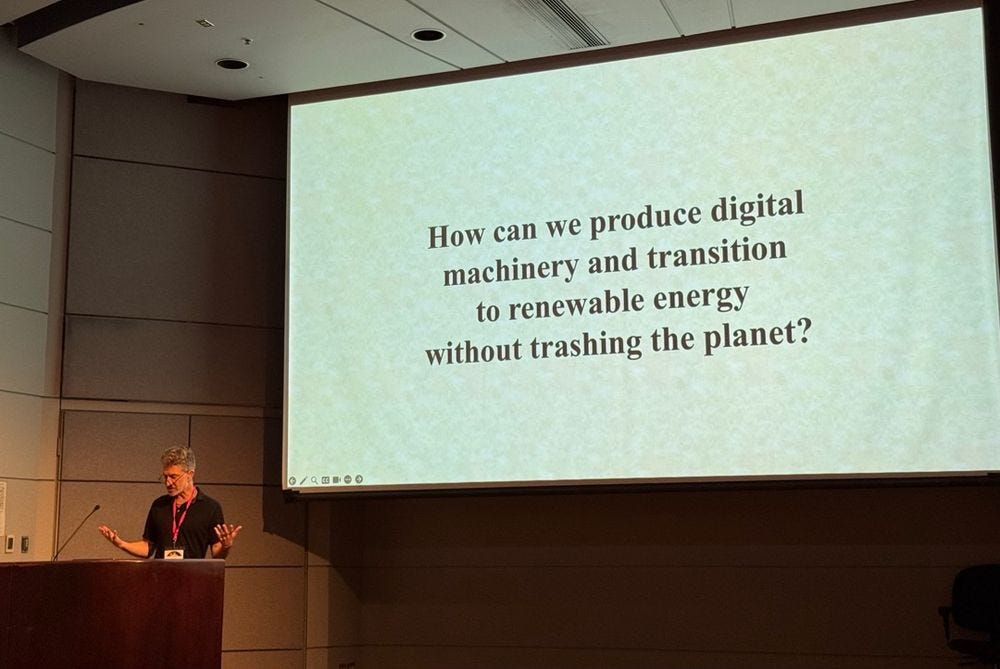Congo’s Corporate Mines Are Awful, Too; From Coal to Critical Metals
And more about the human and environmental costs of renewable energy and digital technology—and how we can do better.
Congo’s Corporate Mines Are Awful, Too
By far the most infamous problem involving critical metals is the children working in cobalt mines in the Democratic Republic of Congo. That single country produces the bulk of the world’s supply of this battery metal. Those kids mostly toil in the country’s informal, small-scale artisanal mines, which produce an estimated 10 to 20 percent of the DRC’s cobalt. But conditions are supposed to be much better in the DRC’s officially licensed, corporation-operated industrial mines. Not by much, though, according to a new report, which finds dismal pay and dangerous conditions are rife in the DRC’s corporate mines.
The researchers interviewed dozens of workers at six major mining operations, most but not all Chinese-operated, as well as outside experts. They found miners were sometimes ordered to work for 30 days straight, denied treatment after accidents, and exposed to toxic substances. “Every week I cough up blood,” said one miner. Their pay may be in line with Congolese minimum wage laws, but the researchers did their own calculations and conclude that it “remains far below what is needed to meet basic living costs.”
“Global demand for Congo’s minerals is soaring, and so are corporate profits,” said Anneke Van Woudenberg, head of the UK-based corporate accountability nonprofit RAID, which produced the report along with the DRC’s Centre d’Aide Juridico-Judiciaire. “There is no excuse for Congolese mine workers to be living in poverty or coughing up blood in unsafe mines. Paying a living wage and upholding basic rights is not charity – it’s a test of whether the transition to green energy will be just and fair.”
This isn’t the first time corporate miners in the DRC have been called out for awful labor practices. A US Department of Labor study in 2023 reported hundreds of cases of forced labor among industrial cobalt workers, and estimates there are probably thousands more. That study also found evidence of children working at corporate worksites. “In aggregate,” summed up the report’s authors, “these findings indicate that labor conditions for cobalt mine workers are abominable.”
People living nearby also suffer. Amnesty International has reported that “the expansion of industrial-scale cobalt and copper mines in the Democratic Republic of the Congo has led to the forced eviction of entire communities and grievous human rights abuses including sexual assault, arson and beatings.”
RAID and CAJJ have been sounding the alarm on these issues for years. According to them, there have been small improvements—some abusive labor subcontractors have been fired, and there are more inspectors in the mines. But the overall picture remains grim.
It’s natural to react to all this by saying ‘Let’s stop buying cobalt from Congo!’ And indeed, some companies are trying to do just that. But there are two problems with that response. One, there isn’t really a substitute for the DRC: it holds staggering reserves of high quality cobalt, far more than any other country. Two, hundreds of thousands of desperately poor Congolese depend on cobalt mining. The DRC is one the poorest countries on Earth; about 80 percent of its citizens live in extreme poverty. If all of the battery makers in the world stopped buying cobalt from the DRC tomorrow, they might make their customers and shareholders feel better, but they would also torpedo the livelihoods of thousands of Congolese.
How, then, to help? Companies that use Congolese cobalt—which is pretty much every electric vehicle and digital product manufacturer, from BYD to Apple—can and should pressure the corporate miners to clean up their act. As for the artisanal miners, who are often in even worse straits, there are groups like the Fair Cobalt Alliance working to improve their conditions. We all benefit from the DRC’s cobalt. It’s only right that the people of the DRC should too. Here’s the European Partnership for Responsible Minerals on why we should be engaging with, not running from, artisanal miners:
From Coal to Critical Metals
How’s this for a sign of the times? A former North Dakota coal mine is being converted into a plant for critical metals. “Instead of making coal, the plant will process minerals like nickel and copper to make products like high-tech batteries for Teslas,” reports KFYVR TV. The new Beulah Minerals Processing Facility is expected to create about 150 jobs—and help wean the US off its dependence on China. May it be the first of many fossil fuel facilities repurposed to produce renewables. (Thanks to fellow Substack Critical Metals Journal for tipping me off!)
Book News
I had a great time keynoting Security Day at the MacDevOps YVR conference last week! Some really interesting conversations with some very smart folks. Interested in having me talk to your conference, meeting, class, or knitting circle? For a limited time, the Writers’ Union of Canada will cover the cost. Drop me a line if you’d like to discuss.
Public speaking is one of the the ways I earn a living in these difficult days—and so is this newsletter. If you find these dispatches interesting and/or useful, please consider becoming a paid subscriber. A bargain at just $5 a month—less than a couple of tacos!
More News Worth Knowing
💸 Senate Bill Would Clobber US Renewable and Critical Metal Industries
👷🏽♀️ Georgia Solar Panel Plant Halts Construction Until Congress Figures Out Budget
⛏️ To Escape China, India Aims to Tap Its Rare Earths






